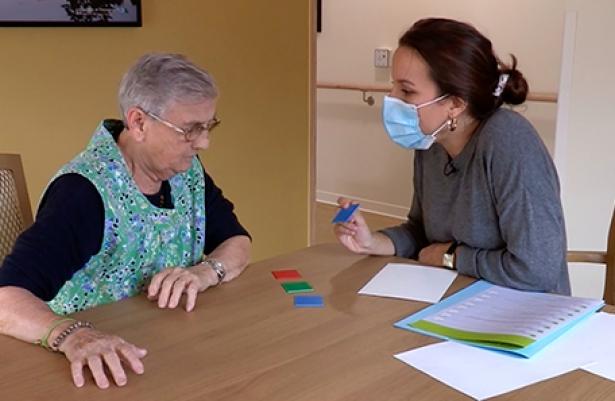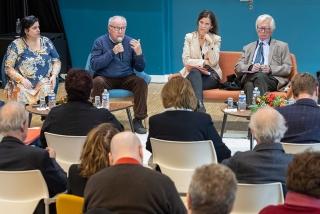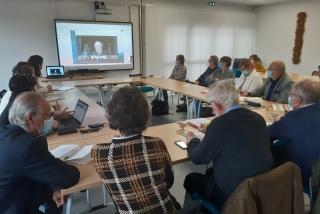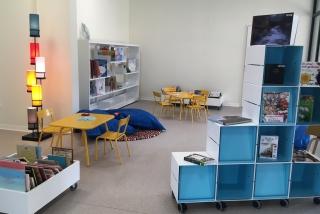But make no mistake: we are far from the medical laboratory here. In this establishment with an innovative and non-drug therapeutic approach, the studies, validated by a scientific and ethical committee, mainly relate to social psychology and the human sciences.
Led by Professor Amieva, an Inserm team is assessing the impact of the Village on all audiences. A comparative study on the social perception of the disease aims to "find out whether such a project which gives a very different image of accommodation and end of life from that of a traditional nursing home can help to improve the representation we have of old age and illness, ”explains Hélène Amieva. The first results show that if negative terms such as “dependence” or “isolation” come up regularly, in the Landes it is more positive words like “benevolence” and “accompaniment” which emerge from the surveys.
A scientific evaluation of the project
Since the opening in June, on-site studies have started. "We question all the audiences concerned on the basis of interviews prepared and structured every 6 months in order to see the evolution of the responses provided over 4 years", explains Rachel Estrade, in charge of evaluating the Villagers. The quality of life of the inhabitants and their loved ones, but also the quality of the work of the professionals or the motivation of the volunteers: all criteria which will make it possible to determine the relevance of this care.
In this multidimensional study funded by the Department of Landes, the viability of the establishment's socio-economic model, and therefore the possibility of reproducing it on a national or even international scale, is also studied.
Our study will shed light on the effects of these innovations on the people received and on their families as well as on professional practices. Florence Zerillo, INNOV'PAD
Study the reproducibility of the innovation
Another research project, called Innov'Pad, has been carried out since 2019. Over a period of 4 years, the implementation of innovative initiatives for the management of Alzheimer's disease and related is studied. The Landais Village is one such example. Florence Zerillo, teacher-researcher in psychology at Bordeaux Montaigne University, details its content: "We are working to understand and analyze the entire genesis of such an innovative project: from its philosophical and political foundations, through its construction phase or its organizational functioning. "The studied models will then be compared with other existing ones.
Managed by the Maison des Sciences de l'Homme in Aquitaine, INNOV’PAD is financially supported by the Nouvelle-Aquitaine Region and supported by the ARS. "Our study will shed light on the effects of these innovations on the people received and on their families (daily life with illness, evolution of social relations, relationship to space and places) as well as on professional practices (forms of professional cooperation, complementarity and mixing of intervention methods) ”, concludes the researcher.
The village open to research requests
Other French and international research projects and initiatives will come to expand the Resource Center, particularly with regard to professional practices that countries could exchange. “For example, we could benefit from training from professionals from Scandinavian countries who are ahead of us in home care. Conversely, time for discussion within the Village could show other practitioners the concrete aspects of the care offered here ”, explains Vincent Galibert, director of the GIP who follows this aspect of the life of the establishment.
Carried out in partnership with the professional teams of the Village and in particular its referring doctor, Dr Gaëlle Marie-Bailleul, all of this research will take several years before results, even intermediate ones, can be known.
The INSERM team
Pr Hélène Amieva, Professeur à l’Université de Bordeaux, spécialité psychogérontologie et épidémiologie, et directrice de l'équipe Inserm - Rachel Estrade, Psychologue spécialisée en psychogérontologie et Santé Publique - Céline Meillon, Biostatisticienne, méthodologiste - Solange Hamelin,Technicien-coordinateur de l’aide psychosociale aux aidants -
Marie Sendra, étudiante en Master Psychogérontologie et Santé Publique - Camille Ouvrard-Brouillou, Psychologue Spécialisée en Psychogérontologie et Santé Publique, Maitre de Conférences - Pr Jérôme Wittwer, Economiste de la Santé, Professeur des Universités - Damien Krier, Economiste de la Santé
The INNOV'PAD team
Marie-Laure Pouchadon : enseignant-chercheur en sociologie - Université Bordeaux Montaigne - Laboratoire de recherche Passages - UMR CNRS 5319 - Florence Zerillo : enseignant-chercheur en psychologie – Université Bordeaux Montaigne - Laboratoire de recherche Passages - UMR CNRS 5319 - Philippe Martin : directeur de recherche - COMPTRASEC – Université de Bordeaux - UMR CNRS 5114.
For any research project proposal, please use the contact form by selecting the subject "Scientific research".



